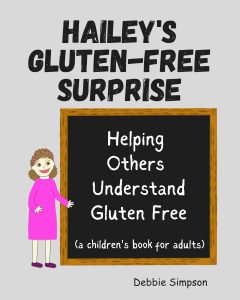This page may contain Amazon affiliate links.
The Emotional Side Part 2: Food is a Memory
Emotional Attachments to Food
Do you have emotional attachments to certain foods? I know I do! Some of those emotional attachments can be strong. After all, food is a memory. That period of mourning that so many of us experience at the start of this gluten-free journey is, in part, connected to this food memory.
Photo albums aren’t the only source of family memories. How many meals, especially special occasion meals, bring you those warm fuzzies? And it’s not because of the taste.
Similar to the nostalgia of a song that might stir warm feelings of a time in our lives, foods can connect us to events and to loved ones. Food truly is a memory.
From The Heart, Not The Lab
What if we only viewed food scientifically? What if we only saw it for its fundamental purpose? We wouldn’t need to talk about the emotional side of dietary differences, would we.
And what is food’s fundamental purpose? Nutrition. Fuel.
Of course, the amount and the correct combination of carbohydrates, fats, proteins, vitamins, and minerals required to support a body varies from person to person, and depends on stage of life. But food’s basic purpose is to support life.
If we ONLY viewed food in this manner, I have no doubt that we would be facing far less disease (mental and physical). Food, after all, has the power to both fight disease and contribute to disease.
But — (BUT) — most of us do not view food only as how can it best serve my body.
Food is Joy
I brought out my newly discovered chocolate peanut butter when my grandson came over recently. I gave him pieces of rice cake topped with this creamy chocolaty, peanut buttery goodness.
The joy he expressed (along with remnants of this tasty treat that remained stuck to each cheek on either side of his adorable little smile) brought joy to this grandma’s heart.
I’m not generally the sugar giving grandma. I don’t feel it my duty or my right to give my grandchildren something their own parents are very careful with. But sometimes I do offer up a treat. Why? Because of that smile.
Did I give my grandson this treat merely for the fuel his body required? Of course not. It gave *me* joy to see his joy. (I just have to remember not to do this too often. There is a difference between filling my emotional need and my grandkids’ nutritional needs.)
Food Is Disgust
What parent hasn’t provided a dinner that the kids turned their noses up at? What parent hasn’t experienced a child’s tears, tantrums, and even gagging over a meal?
“I don’t like potato soup!” That was me as a child. Nope–those food memories aren’t always pleasant ones. (Sorry for those struggles, mom. I LOVE it now, though!)
Food Is Comfort
Sometimes a big bowl of pasta to dig into or a chewy slice of cheese pizza to wrap our hands around is just as cozy as snuggling up in a big fuzzy blanket.
And ... Food Is A Memory
W all have those special foods we look forward to. Grandpa Joe’s homemade apple pie. Aunt Sally’s lasagna. Grandma’s bread stuffing on Thanksgiving.
We don’t look forward to these foods for their nutritional contributions, we look forward to the whole package. Family. Warmth. Love. And that oh-my-goodness-this-is-SO-good!
A Gift (and Beautiful Memory)
Every year since I was married (the first time), we took turns with families for the holidays. In 1996, it just happened that we celebrated Thanksgiving with both our families, four hours away from each other. I wouldn’t realize until months later what a true gift that was.
Thanksgiving. My favorite holiday. Family. It means the world to me.
I know I had stomachaches and far too many trips to the bathroom. (And I recall that stomachache and feeling miserable driving home after our long weekend. I hadn’t been diagnosed with celiac yet.) But my memory of that Thanksgiving is of those two family gatherings. My memories are about the people. They are about the smells from the kitchen that filled each home. The food. And yes, my memories are even about the clean-up afterwards. (Oh how hard I laughed, standing in the middle of the kitchen after a joke my mom told. It doesn’t matter that I don’t remember the joke – what I do remember was that moment, full of fun and tears from laughing so hard.)
What a gift that Thanksgiving was. We didn’t know it then, but it would be the last Thanksgiving we would have with each of our moms.
*IMPORTANT* No matter the diet or restrictions, put focus on the people you are spending time with. Enjoy the time with loved ones (whether you can eat the food or not).
New Traditions from The Old
I tried to continue the family Thanksgiving tradition. But let’s face it, it would never be the same.
So I just put the focus on my own family. I put focus on creating and maintaining traditions for my children. And four Thanksgivings later, another change took place. In September of 2000, I was diagnosed with celiac.
When November arrived, my determination was to provide our traditional Thanksgiving. I wanted a meal that included the stuffing I had every year as long as I could remember. I needed to make that pumpkin pie. Gravy was a must.
Since my earliest memory, Thanksgiving meant bread drying out on cookie sheets overnight. It always included the smell and the sound of onions and celery being chopped. And it included pies: pumpkin, mincemeat, blueberry and cherry. My mom made her own crusts, and they always looked perfect. To me, anyway.
I often wonder how her pie crusts would be gluten free. (Because I know she would have attempted it–for me.)
Oh What a MESS!
I was determined to continue the Thanksgiving traditions I grew up with despite the fact that I now required a gluten-free diet. But how?
An on-line celiac support group led me to Bette Hagman’s cookbook, The Gluten Free Gourmet, which I went out and purchased right away. I was willing to give it a try.
There are now SO MANY gluten-free cookbooks, but Bette Hagman was one of our well respected pioneers when it comes to gluten-free baking. I made her French bread recipe. It called for a stand mixer. I didn’t have a stand mixer. So I tried my hand mixer instead. Oops.
OH. MY. GOSH! I had dough all over the walls. It was all over me. I continued to find speckles on my cabinets for days. There was dough up into the blender so deep that I don’t think I ever did get it completely clean. It was a MESS. And yes, I cried. But amazingly, the bread itself (from the dough that stayed in the bowl) turned out pretty OK. It tasted great. And the best part of all, the stuffing I made from it turned out just like it was supposed to.
This bread (and the process of making it) became my new tradition (with a heavy duty stand mixer, however).
As for the pies, I never was great at it before, always buying the pre-made frozen crusts. But I did learn to make an occasional gluten-free pie to fulfill those pumpkin pie memory traditions.
Side Notes
I no longer need to make my own bread for stuffing. There are now several options for store-bought gluten-free bread. Aldi brand is my favorite.
I purchased the Kitchen Aid mixer shortly after that Thanksgiving. It’s been used 100’s of times over the years. I’ve NEVER regretted that purchase!
It's Not Just About The Person Who Needs To Be Gluten Free
Ever since my third (and last) child was born, in 1989, we stopped traveling for Christmas. We wanted the kids to be able to wake up in their own beds for that magical morning. Our house was open to any guests who wanted to make that trip, but we stayed home for Christmas, making our own family traditions.
As the kids got older, our tradition eventually included going out to dinner and a movie on Christmas Eve. This was followed by driving around to look at lights, and then home to decorate cookies (for the kids and for Santa). I read The Gift of the Magi and The Velveteen Rabbit while tucking the kids in to bed.
For those couple years before I was diagnosed, Red Lobster seemed to be our restaurant of choice. We liked to start out with the spinach artichoke dip as an appetizer.
If you want to know why this transition to gluten free can be difficult sometimes, the following experience is an example why.
Christmas 2000 dinner. Red Lobster. That memory food, spinach artichoke dip, seemed to be safe for me. I was assured by the manager that it was completely gluten free. It was brought to the table, hot and bubbly. Everyone was ready to dive in. But then our server rushed back to the table to stop me. He apologetically informed me that the chips were fried in a shared fryer.
OUCH! The risk of cross contamination was far too great. I was SO wishing I had brought my own chips.
This disappointment wasn’t just mine, however. My poor kids! The sadness on their faces over the fact that mom couldn’t join in this special tradition was clear. And it made me want to cry. Those unshed tears were more for them than for myself.
But then. . .
But then….. (and get the tissues out for this)—-the server brought out fresh chips. They made them fresh, in a clean skillet. They fried those chips up just for me. I’m tearing up just typing this. It was a powerful moment.
What an amazing and kind gesture on the manager and the cook’s part. I doubt they ever knew how much their effort impacted me, although my immediate tears were surely a sign.
My kids couldn’t enjoy that tradition without mom. But all was made right in the world because now I could join in on our traditional appetizer.
A memory that is forever cherished.
Making New Memories
So yes, food is a memory. But, as you can see, having to be gluten free doesn’t have to mean an end to all those special favorites. Nope, not everyone is going to change their recipes for us. Not everyone is going to learn how to cook or bake gluten free. Not everyone is going to learn how to avoid cross contamination. But we can fill in some of those voids.
And…..
We can create NEW traditions (and new memories).
The first restaurant I discovered to be a safe zone (that I learned about through a local celiac support group) was Nacho Mamas in St. Louis. The combination of safe food, yummy food, and being there with people I like to be with, makes this a super special place to eat when I’m with my (now adult) kids.
The memories and traditions my grandchildren have of baking cookies with grandma, or making pancakes in the morning after a sleep-over, are gluten free. Of course the fact that they are gluten free doesn’t matter. But they are our forever memories.
Food memories from current holiday and family traditions are always gluten free when at my house. We have developed new traditions over the years. Everyone has their special dishes they contribute–and all are gluten free.
Change often starts with resistance. But through hard work and perseverance, and by not allowing the what was to over-shadow the what can be, you CAN make it to the top of your mountain.





